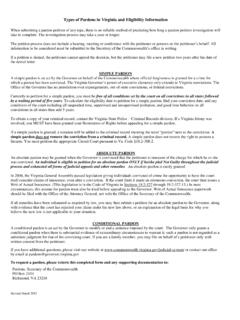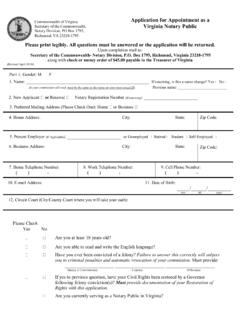Transcription of A HANDBOOK FOR VIRGINIA NOTARIES PUBLIC
1 1 A HANDBOOK FOR VIRGINIA NOTARIES PUBLIC Published by the Office of the Secretary of the Commonwealth April 6, 2021 Notary PUBLIC Division Post Office Box 1795 Richmond, VIRGINIA 23218-1795 E-Mail: Tel. (804) 692-2536 Fax (804) 371-0017 2 TABLE OF CONTENTS INTRODUCTION .. Page 3 THE NOTARY S FUNCTION .. Page 3 TYPES OF NOTARIES IN VIRGINIA .. Page 3 TRADITIONAL NOTARY .. Page 4 - QUALIFICATIONS FOR APPOINTMENT .. Page 4 - OBTAINING A COMMISSION .. Page 4 - TERMS OF OFFICE .. Page 5 - SEALS/STAMPS .. Page 5 - ALLOWABLE FEES .. Page 5 - JOURNAL .. Page 6 - JURISDICTION .. Page 6 ELECTRONIC NOTARY PUBLIC .
2 Page 6 - QUALIFICATIONS FOR OBTAINING A COMMISSION .. Page 6 - TERMS OF OFFICE .. Page 6 - SEALS AND SIGNATURES .. Page 6 - ALLOWABLE FEES .. Page 7 - JOURNAL .. Page 8 - JURISDICTION .. Page 8 - REMOTE OR ONLINE ELECTRONIC NOTARIZATION .. Page 8 - SATISFACTORY EVIDENCE OF THE SIGNER S IDENTITY .. Page 8 - PERFORMANCE REQUIREMENTS .. Page 9 POWERS, LIMITATIONS, AND RESPONSIBILITIES .. Page 9 (TRADITIONAL AND ELECTRONIC NOTARIES PUBLIC ) - THE NOTARY S POWERS .. Page 9 - THE NOTARY S GREATEST RESPONSIBILITY .. Page 10 - REQUIRED INFORMATION WHEN NOTARIZING A DOCUMENT .Page 11 - SAMPLE ACKNOWLEDGEMENTS.
3 Page 12 - CHANGE OF NAME .. Page 13 - CHANGE OF CONTACT INFORMATION .. Page 13 - REPORTING LOST OR STOLEN NOTARY INFORMATION .. Page 13 - RESIGNATION .. Page 13 - CONFLICT OF INTEREST .. Page 14 - BONDS AND INSURANCE .. Page 14 - VIOLATION OF NOTARY LAW .. Page 14 3 INTRODUCTION This HANDBOOK is intended as a general guide and is designed to assist non-attorney NOTARIES with the general requirements, duties, powers, limitations, liabilities, and legal significance of their actions as a notary PUBLIC . Legal counsel should be consulted whenever specific problems or questions arise concerning any aspect of the office of notary PUBLIC .
4 THE NOTARY S FUNCTION A notary PUBLIC is a PUBLIC official whose powers and duties are defined by statute. A notary acts as an official, unbiased witness to the identity and signature of the person who comes before the notary for a specific purpose. The person may be taking an oath, giving oral or written testimony, or signing or acknowledging his or her signature on a legal document. In each case, the notary attests that certain formalities have been observed. The key function is to be certain that the person appearing before the notary is who that person claims to be. NOTARIES must constantly be aware that every notarial act affects the legal rights of others. Carelessness or negligence by the notary may injure these rights.
5 A notary who fails to perform notarial acts lawfully and in good faith may be civilly liable for damages caused by their official misconduct. The employer of a notary may also be liable for the notary s misconduct under certain conditions described later in this HANDBOOK . TYPES OF NOTARIES IN VIRGINIA The Code of VIRGINIA allows for two different types of notary commissions to be issued in the Commonwealth: 1. Traditional notary PUBLIC commissions 2. Electronic notary PUBLIC commissions The difference between the two types of notary PUBLIC commissions are the tools that are used to perform the notarial act and, in some cases, the criteria for establishing the identity of the person seeking a notarization.
6 To apply for an electronic notary PUBLIC commission, the applicant must first be commissioned as a TRADITIONAL VIRGINIA notary PUBLIC . 4 TRADITIONAL NOTARY PUBLIC A traditional notarization is an official act performed by a traditional notary PUBLIC using their seal and physical signature on documents. QUALIFICATIONS FOR APPOINTMENT ( , ) Under the laws of VIRGINIA , the Governor may appoint an unlimited number of NOTARIES PUBLIC . A notary must be: 1. At least eighteen years old 2. A legal resident of the United States 3. Able to read and write the English language 4. A resident of VIRGINIA or regularly employed in the state and perform notary services in connection with their employment.
7 (A non-resident notary who ceases to be regularly employed in VIRGINIA must surrender their commission.) 5. No person who has ever been convicted of a felony under the laws of the United States, the Commonwealth of VIRGINIA , or the laws of any other state, qualify to be appointed and commissioned as a notary PUBLIC unless such person has had their civil rights restored or received a pardon for the crimes depending on where the felony was occurred. OBTAINING A COMMISSION ( , , ) Applications for appointment as a notary PUBLIC are available from most Circuit Court clerk s offices, on the Secretary of the Commonwealth s website, and from the Secretary of the Commonwealth s office.
8 To become a commissioned notary, a completed application, along with a fee of $45 must be sent to the Secretary of the Commonwealth s office. The name on the application and commission must exactly match the notary s state issued identification. Each notary commission is sent to the city or county Circuit Court in which the applicant has elected to take the oath of office. A notice is sent to the preferred mailing address indicated by the applicant on their application. When an e-mail address is indicated on the application as the preferred mailing address, only an e-mail notice will be sent. It is the applicant s responsibility to go to the Circuit Court to claim his or her commission and take the oath of office.
9 At that time, the applicant will be required to pay a fee of $10 to the Clerk. If a notary commission is not claimed within sixty days from its issuance, it becomes invalid. Failure to claim the commission within sixty days is not excused for ANY REASON, including non-receipt of the notice. Thereafter, if the applicant wishes to be a notary, a new application and a new fee must be submitted. 5 An applicant who has not received notice within four weeks of mailing their application to the Office of the Secretary of the Commonwealth, should call the Clerk of Court to verify if the commission has been received. If it has not, the applicant should contact the Secretary of the Commonwealth s office.
10 TERMS OF OFFICE ( , ) A notary s commission term is four years, expiring on the last day of the notary s birth month. The commission may be renewed every fourth year by filing a new application with the Secretary of the Commonwealth. After their term has expired, NOTARIES must not act as such unless a new commission has been obtained. Acting under an expired commission may constitute a criminal offense. SEALS/STAMPS VIRGINIA law requires a notary to affix a seal or stamp on every document they notarize. The law specifies that the seal/stamp be sharp, legible, permanent and photographically reproducible. Care should be taken not to obscure the signatures or other parts of the document when applying the seal/stamp to the document.





